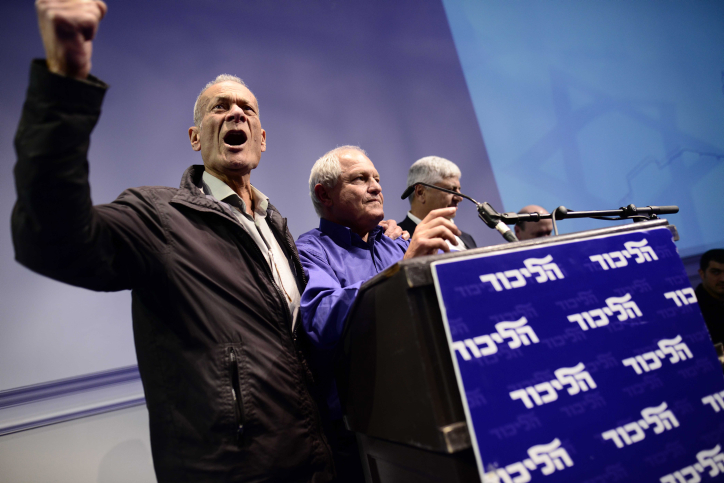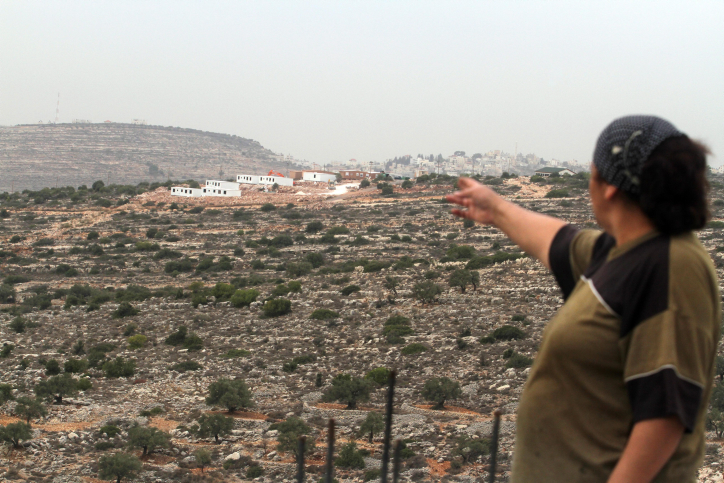Netanyahu’s party and government are finally making explicit what has long been implied: rejecting the premise that the Palestinians will ever have a state of their own.

Over the past few years, analysts have been using the term “creeping annexation” to describe Israel’s land grabbing, segregationist policies in the West Bank. But over the past few days, the country’s leaders have been openly signaling that annexation need no longer creep. It is the new game in town.
On Sunday night, Likud’s Central Committee, the body responsible for updating the party’s constitution, unanimously passed a resolution to extend Israeli sovereignty to all West Bank settlements, effectively annexing them to Israel.
The Likud decision received a significant boost from Justice Minister Ayelet Shaked, who announced Wednesday that beginning next week, all new pieces of government-supported legislation would include a short directive on how they are to be applied to Israeli settlements. The move, Shaked said Wednesday morning at a Knesset committee hearing, will help implement government policy in the settlements and “normalize life in Judea and Samaria.”
Tourism Minister Yariv Levin joined in. “The inequality between the residents of Judea and Samaria and the rest of the country cries to the heavens,” he told the committee, referring to the difference between the legal situations for Jewish Israeli settlers and Israelis who live inside Israel proper. “Until the necessity of applying sovereignty across all parts of the Land of Israel is formalized, we must fix this absurd situation.”

Palestinians, for their part, will not likely feel the short-term consequences of these two decisions. They will continue to languish under a military regime that deprives them of their basic rights, behind walls and fences that keep them physically and psychologically out of Israeli sight.
Taken together, Likud and Shaked’s decisions are important for both their practical and psychological implications: they are changing the paradigm. If, until now, annexation was openly championed only by those on the far-right, today it has become a fundamental tenet of Israel’s ruling party, and the Justice Ministry is continuing to lay the groundwork for its future implementation.
These are certainly not the first moves toward annexation. In February of last year, the Knesset passed the “Formalization Law,” which retroactively legalizes settlement outposts built on private Palestinian land. Months later came the “Greater Jerusalem law”, which would extend Jerusalem’s municipal umbrella over dozens of West Bank settlements, along with well over 100,000 settlers. And on Monday night the government approved the “Jerusalem Law,” which paves the way for establishing a separate, Palestinian-only municipality.
Even Israel’s Foreign Ministry treats settlements as an organic extension of the state, rather than pieces of land over which to negotiate. Commissioned by Deputy Foreign Minister Tzipi Hotovely, a new series of pamphlets to be handed out to students on U.S. college campuses explains the Israeli point of view on a variety of contentious issues. The pamphlet on settlements argues that Jews have lived in Judea and Samaria for “thousands of years,” and that labeling Jewish communities there a form “colonialism” is as “disingenuous as it is politically motivated.”
In effect, Netanyahu’s party and government are pulling off the masks and telling the world: this country fundamentally rejects the premise that Palestinians will ever have a state of their own. It means that Palestinians, politically fractured and left to fend for themselves by the rest of the world, will have to accept whatever crumbs Israel leaves after it carves up the cake. No one — not the political Left, center, or moderate Right — seems interested in stopping it.
Our inexorable march

Like Trump’s Jerusalem declaration in early December 2017, Shaked and the Likud Central Committee’s decision amount to pulling the plug on what has come to be known as the “status quo” in Israel-Palestine — in which one side lives under perpetual military dictatorship, while the other lives as if there is no occupation.
When it comes to the occupation, their convenient choice is the not having to make a choice. Analysts like my colleague Noam Sheizaf have explained that eschewing both the one and the two state solutions and selecting instead a third option — the status quo — feels like the rational choice for most Israelis. They do not believe the investment in peace will benefit them, and no one is pressuring them to make a decision.
But there is nothing static about the status quo. What we are witnessing is an inexorable march toward a Greater Israel.
The pivot toward out-in-the-open annexation does not just mean acknowledging what the Israeli government is doing in its own words. It also means recognizing that the vision of Greater Israel looks a lot like the vision of Historic Palestine — with Tel Aviv, Jenin, Ariel, Eilat, and Gaza City all part of the same political-territorial unit. Not everyone who shares this land necessarily wants to (though some Palestinians and Israelis certainly do), but it is becoming harder to deny that is our current reality, and most likely, our future.

